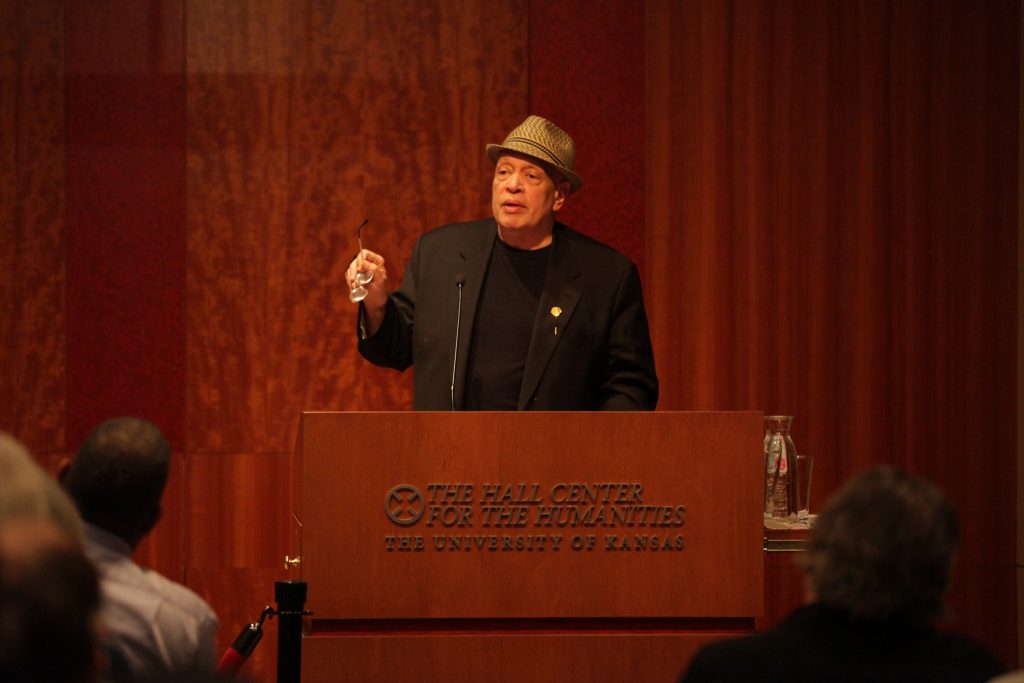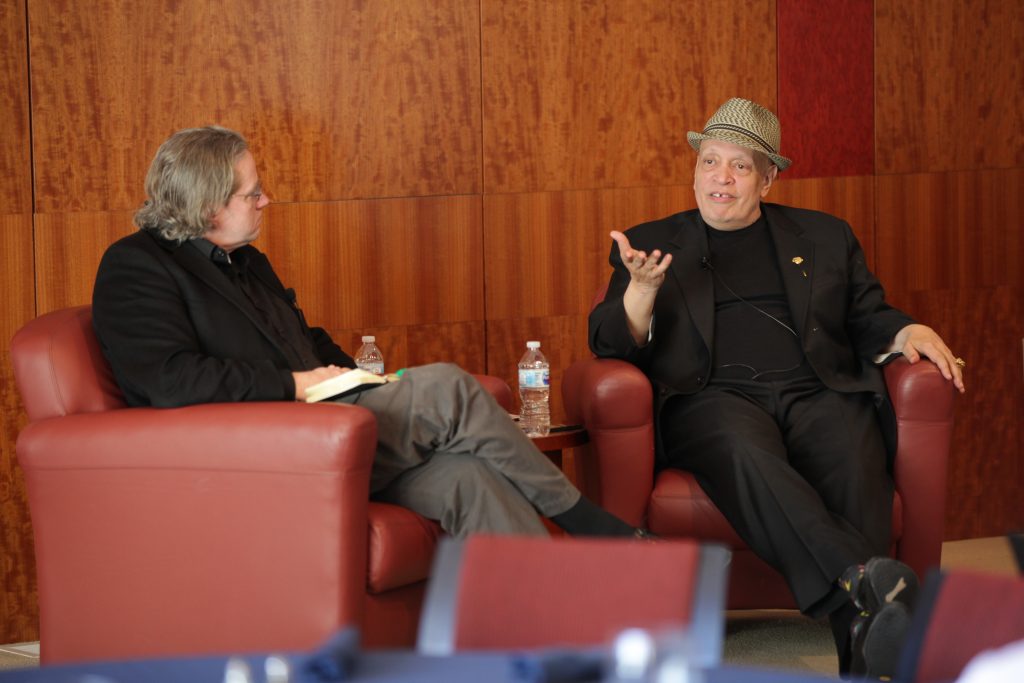This content is being reviewed in light of recent changes to federal guidance.
“No Saint”

Photo credit: The Hall Center
Call Walter Mosley what you may: novelist, playwright, artist, public speaker. Just don’t call him a saint. Much like Ezekiel “Easy” Rawlins, the troubled protagonist of his renowned mystery series, Mosley is not a devout man – that is, not in most respects.
“I can’t help but believe in the soul,” the award-winning writer said during his visit to the University of Kansas earlier this month.
Perhaps this belief, along with a practiced optimism bred from growing up black in America – where, more often than not, hope is all one has in the face of racial injustice – allowed Mosley to impart a bit of inspiration on two topics of personal interest to him, politics and writing.
His ministrations began February 7th while speaking to a capacity audience in the Hall Center for Humanities. His sermon: “Political Optimism in the Age of Trump.”
Mosley, I should note here, is no fan of our nation’s 45th president, whose presidential campaign and subsequent term in the White House has been mired in controversy and scandal too long to list in this humble post. “He’s an idiot,” Mosley said.
Mr. Trump’s folly, however, is cause for optimism. At least, Mosley, who prefers Trump over other republican challengers in 2016, seems to think so. This preference is grounded in the notion that Trump lacks the sophistication required to camouflage his political machinations with smoke and mirrors, making his agenda of intolerance and discrimination apparent to the American public.
Moreover, Mosley remains hopeful that this administration — with its alternative facts, travel bans on Muslims, and recent government shutdown — just might unite Americans. “His (Trump’s) racism and greed will not undo us,” he said. “Things are open and there’s a chance for us to work together and change together.”
Mosley returned to the Hall Center on February 8th to extol the tenets of writing – a craft that has earned him an O’Henry Award, a Grammy Award, two NAACP Image Awards, and a Lifetime Achievement Edgar from Mystery Writers of America.
His first suggestion is one that may sound familiar to some writers: revise.
“Writing is rewriting,” he said. “You discover the story you’re telling while retelling it and then retelling it again. You may start out thinking that you’re telling one tale but after the fourth or fortieth rewrite an entirely different creature crawls out onto the page.”
His craft book, This Year You Write Your Novel (Little Brown and Company, 2009) is full of the kind of writerly advice that inspires discipline and dedication to the process. Mosley offered up a few verses from this text.

Write Every Day: “That’s seven days a week, including holidays,” Mosley said. “This is the normal commitment of any athlete politician or parent.” What is written is just as important as the act of writing itself. Daily devotion to putting words on the page should bring the writer closer to a long-term goal, like completing a novel, play, poetry collection, or biography.
Write Without Restraint: Writing teachers the world over recite this sacred verse. Still, many aspiring writers, fearful of how their work may be judged by one reader or another, are nothing if not stealthy self-editors. Mosley has one suggestion for this insidious habit – stop. “Stop listening to the disapproval of man and critics. Stop keeping yourself from saying those things you feel are wrong or bad or even evil. You should edit but never censor your words.”
Voice and Point of View: The key here, Moseley says, is consistency. Once the writer has nailed down her protagonist’s narrative voice and POV, she should see it through until the end of her draft. This process will teach her something about her story. If things change during the revision stage, then so be it. Just be consistent.
Show and Tell: Mosely’s guidance here is so well-stated that it is doubtful a summary will achieve the same effect. To that end, I have left his statement in-tact for the writer who, perhaps lacking access to the text itself, might revisit this statement for inspiration and direction. “‘The words came right up off the page.’ That’s the highest possible praise for the technique of any writer. It means that, when reading the book, the reader was actually experiencing the sensations and emotions, life and atmosphere depicted. The accomplished writer achieves this level of realism by using language that is active and metaphorical, economically emotional, and also pedestrian. As often as possible, the fiction writer shows physical movement and active characters, vivid images and real dialogue rather than simply telling us what happened, what was said, or what someone was thinking or feeling. It is the difference between: His name was Ishmael and Call me Ishmael.”
And call Mosley an optimist – at least when it comes to what lies ahead for this country after Donald Trump. Despite his aversion to organized religion, he is a man of faith, faith in humanity’s capacity to, with patience and understanding, build a better world, tell a better story. He’s no saint, but, then again, he never claimed to be.
Vince Omni is a creative writing student in the MFA program and teaches first-year composition at the University of Kansas. He manages HBW’s fiction acquisitions and helps develops content for the Black Literary Suite and blog.